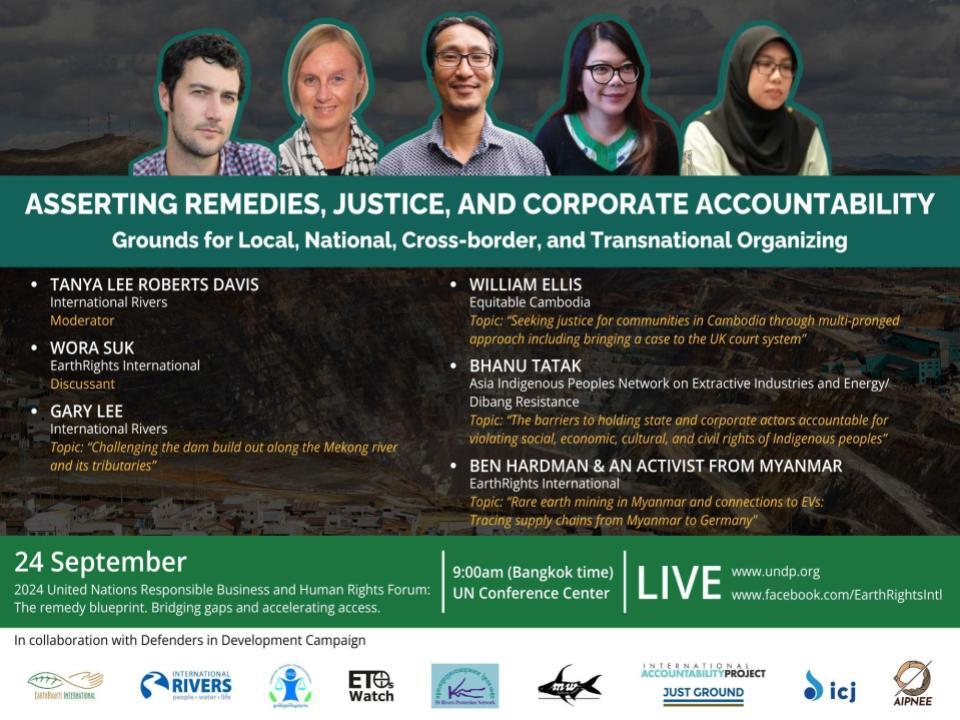Event at the Regional UN Responsible Business and Human Rights Forum
Event Time: Tuesday, September 24th at 9:00 am ICT
Event Hosts: EarthRights International, International Rivers, Community Resource Centre Foundation, ETO Watch, 3S Rivers Protection Network (3SPN), Mekong Watch (Japan), Defenders in Development Campaign, International Accountability Project (IAP), Just Ground, International Commission of Jurists-ICJ, Asia Indigenous Peoples Network on Extractive Industries and Energy (AIPNEE), Dibang Resistance
Event Location: UN Conference Center, Bangkok, Thailand
Livestreaming on UNDP website on www.undp.org and Facebook www.facebook.com/EarthRightsIntl
Summary
This session will highlight how community rights defenders are leveraging domestic and international mechanisms for justice and accountability when faced by dispossession as well as irreparable ecological harms caused by corporate and state-backed development projects. It will underscore the challenges of responding to heavy military presence and cross-border project impacts.
Speakers
Gary Lee, International Rivers
William Ellis, Equitable Cambodia
Bhanu Tatak, Asia Indigenous Peoples Network on Extractive Industries and Energy and Dibang Resistance
Myanmar Activist, and Ben Hardman, EarthRights International
Moderated by Tanya Lee Roberts Davis, International Rivers
Background
Across the region, communities are confronted by attempts of powerful state-backed and private sector actors seeking to turn the current economic, food, energy and climate crises into business opportunities by extracting rare earths and other mineral deposits, building out new large-scale hydroelectric dams to churn out so-called ‘clean’ energy, or clearing vast expanses for export-driven agribusiness. These sites of sacrifice often overlap with customary territories of Indigenous Peoples, ethnic minorities and other already marginalized rural populations. As a result, in pursuing these projects, proponents are responsible for causing physical, economic, social and cultural dislocation among other human rights violations, as well as irreparable ecological loss and damage. Lines of accountability are blurred however, because not only is financing for these endeavors often sourced from a mix of public and private institutions, but also information about responsible actors often may be opaque, and the sites for where the minerals, energy or agricultural goods are destined are outside national or even regional boundaries.
As sites of development are upheld as matters of national security and may be under heavy surveillance by armed personnel, outspoken community members and their allies who raise critical questions and concerns – or seek remedy to harms – risk becoming the target of incarceration under trumped up charges, Strategic Litigation Against Public Participation suits and other retaliatory physical and psychological violence.
Impacts may also span across national borders, placing the burden on communities in neighboring states to prove they are also among populations experiencing harms, damages and losses which require redress.
In the face of such challenges, community rights defenders and allied groups are not only looking to domestic frameworks and mechanisms (such as B&HR National Action Plans, national human rights commissions and courts), but also leveraging accountability mechanisms of international financial institutions and launching cases in the jurisdictions where responsible parent companies are headquartered.
Discussants in this session will bring into focus cases from Myanmar, Cambodia, Thailand and India, providing a snapshot of realities at project sites, what community concerns are arising and how civil society groups are collaborating in an effort to hold responsible state, business and financial actors to task for redress and remedy.

